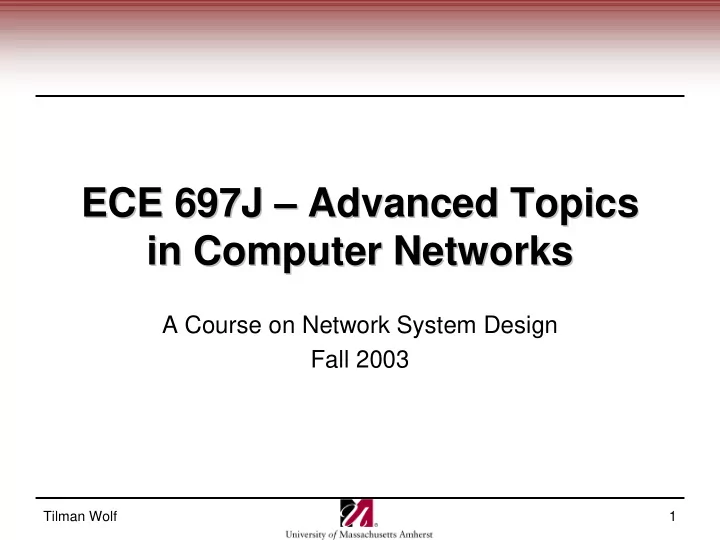

ECE 697J – – Advanced Topics Advanced Topics ECE 697J in Computer Networks in Computer Networks A Course on Network System Design Fall 2003 Tilman Wolf 1
Welcome Welcome • Who am I? – Tilman Wolf, Assistant Professor in ECE – Office: KEB 211C – Email: wolf@ecs.umass.edu – Come by anytime • My research interests: – Computer networks – How to make networks programmable and adaptable to new uses – Network processors – Network measurements – Network and system security Tilman Wolf 2
What is a Network? What is a Network? • Or more specifically: “What is the Internet?” Tilman Wolf 3
Answer I Answer I Tilman Wolf 4
Answer II Answer II Tilman Wolf 5
Answer III Answer III Tilman Wolf 6
Answer IV Answer IV Tilman Wolf 7
What’s the Common Theme? What’s the Common Theme? • Network is a system of interconnected end-systems and routers • End-systems: – Computers/devices that need to communicate • Interconnection/links: – Fiber/wire/radio connections • Routers: – Devices that know how to pass data towards the end-system • Routers are integral part of the network • Routers determine the quality/properties of network – Functionality – Performance – Reliability – Security • What will be covered in this course? Tilman Wolf 8
What is this Course About? What is this Course About? • Course discusses network systems (i.e., routers) – Functionality of routers – How to implement them efficiently – How to expand their functionality for next-generation networks • This is a broad area – we’ll focus on – Data-plane (not control plane, routing protocols, …) – Packet-based networks (in particular IP networks) – Concepts of router functions (not how to setup a Cisco system) – Intel IXP network processor (example of a programmable router) Tilman Wolf 9
Syllabus Syllabus • Networking basics • Packet processing (3 lectures) • Router architectures (2 lectures) • Switching fabrics • Novel network applications • Active and programmable networks • Design basics of network processors • Commercial NP architectures • Design trade-offs in NP architectures • Intel IXP1200 (4 lectures + 6 lab sessions) • Network Measurements • Network Security • Future trends and new technologies • Final projects (3 lectures) Tilman Wolf 10
Why take this Course? Why take this Course? • Networks are important component of computer systems • Understanding high-level network protocols is not everything • Implementation details help understand – How things really work – Why things break – Performance issues – Security issues • Principles are applicable to many systems • Lab will help you get some hand-on experience – Lab is only part of course • Papers give insight into current research problems Tilman Wolf 11
Course Details Course Details • Classes: Tuesdays & Thursdays 2:30-3:45 • Class room: Elab 306 • Grade is composed of – 20% Presentation – 20% Discussion contribution – 20% Lab assignments – 40% Final project • There is not final exam or quizzes • If you read the book/papers, attend class, and do lab assignments, you’ll probably do well. Tilman Wolf 12
Grading Grading • Presentations – Each student will present a paper or book chapter – 20–30 minutes PowerPoint presentation – Lead discussion for ~10 minutes – Grading based on quality of slides and delivery • Discussion – Everybody is expected read book and papers as assigned – Discussion in class is important and one of best learning tools – Quality and quantity of contributions is considered for grade – Class attendance is necessary to make contributions ☺ • Active participation is one main objective of this course – Important skill for your professional development – Class discussions were the best part of last year’s course Tilman Wolf 13
Textbook Textbook • Douglas Comer: “Network System Design using Network Processors,” Pearson/Prentice Hall, 2004. • Three parts: – “Traditional Protocol Processing Systems” = router architectures, packet processing details – “Network Processor Technology” = NP architectures – “Example Network Processor” = Intel IXP1200 architecture • Classes will follow book Tilman Wolf 14
Network Processor Lab Network Processor Lab • New lab setup in progress (Marcus 15B) • Sponsored by Intel – PC workstations with IXP1200 network processor • IXP1200 can be programmed to behave like routers • Three simple lab assignments • Also used for final project Tilman Wolf 15
Ground Rules Ground Rules • You are encouraged to participate in class – Ask questions – Feel free to comment on anything – Nobody knows everything – don’t worry that you may something wrong – Respect others • Academic Integrity – You should discuss lab assignments with others – Don’t copy from others – If you do, you will not get any points and may get and overall F • Let’s have fun! Tilman Wolf 16
For next Class For next Class • Get textbook • Read pages 1-24 (chapters 1-3) • Recap networking basics Tilman Wolf 17
Recommend
More recommend